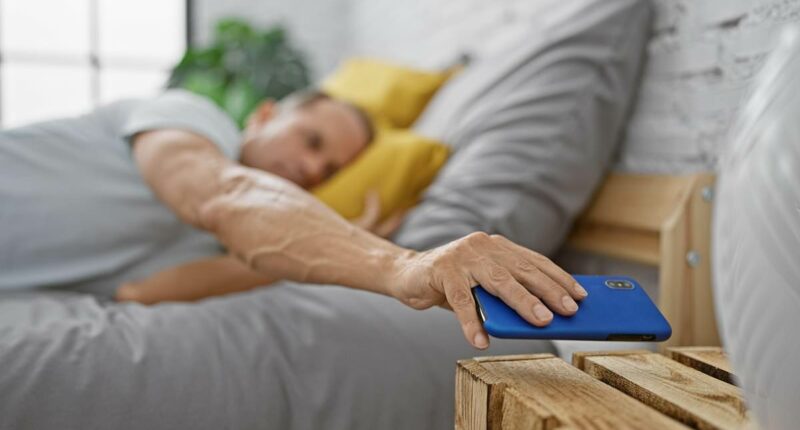Share this @internewscast.com
A holistic doctor has revealed how long you need to avoid screens before bed in order to get the best night of rest – and the answer may shock you.
The startling information was recently shared on TikTok by Dr. Janine Bowring, a Canada-based expert with over 25 years of experience.
She explained in the video that this was her ‘top sleep tip’ for women who are over the age of 40.
‘Are you waking up at 3am?’ she began the video.
‘Well, it could be your screen time before that that is the culprit,’ she explained.
Dr. Bowring shared that you should avoid screens for at least two hours before bed each night to get a good night’s sleep.
‘That blue light suppresses your melatonin, of course, disrupting your sleep,’ the holistic doctor explained.
‘Melatonin is crucial for regulating your sleep-wake cycle, your circadian rhythms,’ she continued.

A holistic doctor has revealed how long you need to avoid screens before bed in order to get the best night of rest – and the answer may shock you

Dr. Bowring shared that you should avoid screens for at least two hours before bed each night to get a good night’s sleep (stock image)
‘Evening exposure to that blue light from your screens can delay your sleep onset and reduce your proper sleep quality throughout the night as well.’
A study published in March in Frontiers in Psychiatry revealed that just an additional hour of screen time before bed led to 24 minutes less sleep.
The study also found that it resulted in a 59 percent higher risk of insomnia.
Dr. Bowring stressed in her video that your screen time may be why you’re waking up in the middle of the night.
‘My suggestion is to switch off screens at least two hours before bedtime, and if you must use screens after sunset, protect your eyes with blue-light blocking glasses,’ advised the doctor.
Having less screen time before bed isn’t the only naturopathic tip the doctor has shared in recent months.
In January, she revealed that taking fewer breaths may actually be the secret to a longer life.
‘The average adult takes about 15 to 20 breaths per minute, which is actually far too much,’ Dr. Bowring claimed at the time.

Dr. Bowring explained in her video that your screen time is why you may be waking up in the middle of the night (stock image)
‘If you can slow your breathing down to about five point five breaths per minute, that is related now to longevity,’ she continued.
The doctor proceeded to liken humans to animals such as dolphins and whales, which breathe less frequently and have longer lifespans compared to humans.
She said that these mammals only take three to five breaths per minute.
‘Whereas, a mouse takes 90 to 250 breaths per minute, and they only live two to seven years,’ she explained.
‘We know that stress leads to faster breathing, and since stress is associated with shorter lifespans, my advice is to focus on conscious breathing to slow down the breath,’ the doctor added.
‘This is one of the reasons why meditation and yoga can be really powerful and helping you to live longer,’ she concluded.









